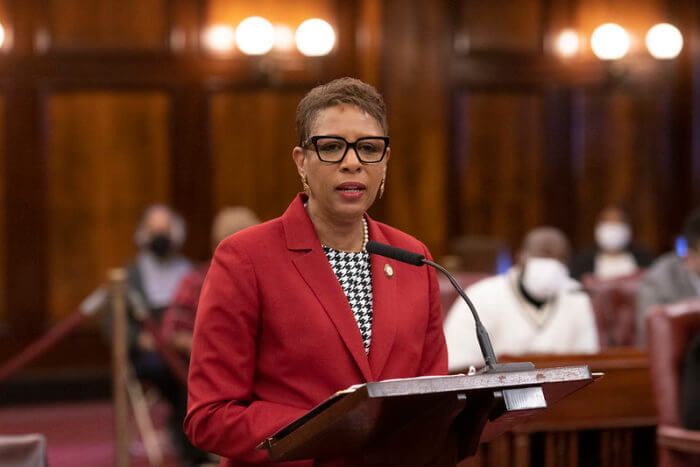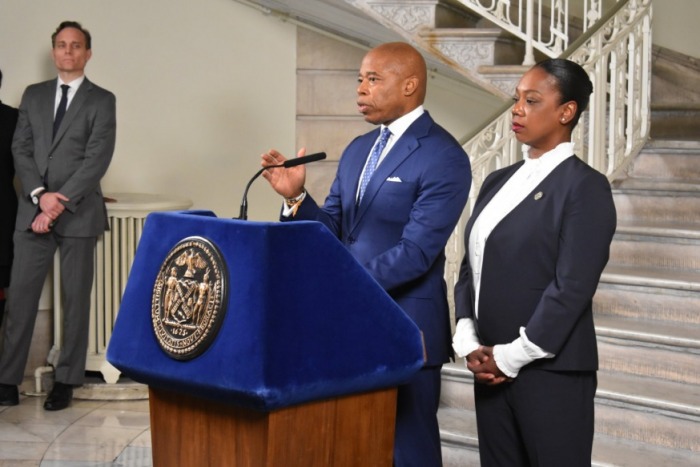
City Council Speaker Adrienne Adams. (Photo Courtesy of John McCarten/NYC Council Media Unit)
Dec. 21, 2022 By Ethan Stark-Miller
Mayor Eric Adams and City Council Speaker Adrienne Adams (no relation) are at odds over the mayor’s suggestion that the council cut its nearly $600 million discretionary budget in half as a means of fiscal belt-tightening amid the growing expense of the migrant crisis currently engulfing the Big Apple.
The discretionary funds are distributed among the city’s 51 council members and go towards funding non-profit organizations that provide district-specific services and run initiatives. Hizzoner first revealed he was making the request in an interview with the New York Post Editorial Board Tuesday, noting that his office had sent a letter to the speaker’s, asking for the cuts.
However, council leadership didn’t receive the letter until late Tuesday night, after the Post had revealed the missive, which amNewYork Metro verified by viewing the email.
The speaker’s office issued a strongly worded rebuke of the mayor’s request on Tuesday night, along with his decision to share it with the Post Editorial Board first. Speaker Adams struck a similar tone while taking questions from reporters during an unrelated press conference on Wednesday afternoon.
“We were quite surprised that the mayor seemed to want to renegotiate the budget with the New York Post Editorial Board, that’s not exactly how city government works,” Speaker Adams said. “We cannot allow the mayor’s suggestion that we cut a lifeline to communities stand as a viable option. These are service providers. Viable, needed service providers that provide the lifeline to New Yorkers in need.”
Not only are the non-profit service providers – which are funded by the discretionary pot – essential to providing support for communities of color across the city, the speaker said, but they’ve also been a key part of addressing the over 31,000 migrants who’ve come here since April.
“This council funds all nonprofit organizations, all service providers that are relied on by communities across the city, especially black and brown communities, Asian communities, immigrant communities, LGBTQIA plus communities,” the speaker told reporters. “In fact, [they’re] the organizations doing the lion’s share of work to address the asylum seeker crisis, especially since many of our city agencies are understaffed and under-resourced.”
The speaker also argued the cuts aren’t necessary now that it looks like the city will nab a sizable chunk of $800 million in federal relief funds for cities on the front lines of the migrant crisis through an omnibus spending bill likely to pass Congress this week.
The dust up between the two sides of City Hall followed two full days of City Council hearings examining the administration’s handling of the migrant crisis, which the speaker and many council members have been quite critical of.
During the mayor’s own unrelated news conference Wednesday afternoon, he pushed back on the speaker’s comments that he was negotiating the budget with the Post Editorial Board saying.
“I was asked a question and I answered,” he said. “It wasn’t negotiating the budget. I’m pretty sure they’re asked questions and they answer them.”

Mayor Eric Adams with Police Commissioner Keechant Sewell at City Hall on Wednesday. (Photo by Matt Tracy)
Additionally, the mayor said his suggestion that the council halve their discretionary spending was simply a request for them to participate more in the city’s response to the migrant crisis. He claimed were several unnamed council members suggestions during the hearings that the city provide asylum seekers with a suite of free perks on the city’s dime.
“I’m hearing people are saying ‘give free telephones, give free MetroCards,’” he lamented. “Everyday New Yorkers don’t have free telephones. Everyday New Yorkers don’t have free MetroCards. Everyday New Yorkers are not given free places to live. So, when the council stated, and some of the members stated, ‘we need to give everything free,’ I’m saying ‘you guys have a half a billion dollars in discretionary dollars, if you really feel as though we should be giving free, then can you voluntarily give us 50% of what you’re doing so we can do this together?’”
This story first appeared on amny.com.






